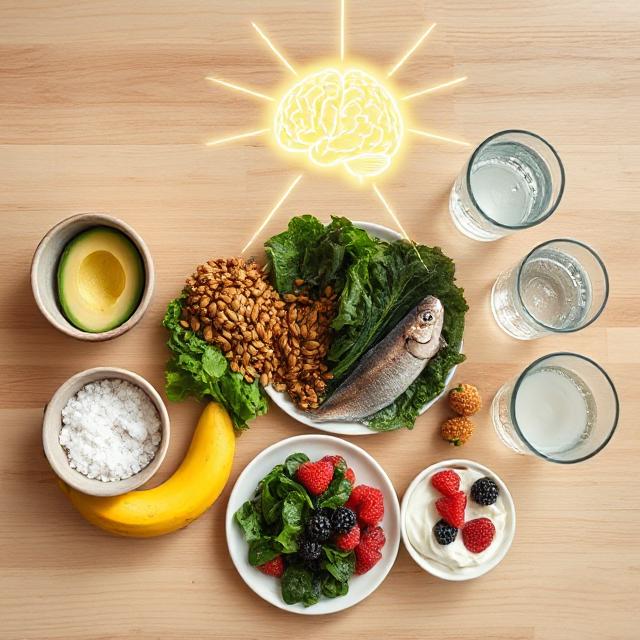
Table of Contents
Whole-Food Electrolyte Boosters Worth Eating
You’ve likely heard of electrolytes—minerals like sodium, potassium, magnesium, and calcium that power your brain, nerves, and muscles. But the moment you reach for a bottle labeled “electrolyte drink,” you’re often swallowing artificial sweeteners, low-quality salts, and neon dyes. Fortunately, nature already provides potent whole-food electrolyte boosters that replenish minerals without the junk.
If you want sustained cognitive energy, stable mood, and better stress resilience, the secret may lie not in a supplement—but in your kitchen.
Let’s explore the best real-food sources of electrolytes, how they compare to commercial products, and how to time them for maximum mental and metabolic benefit.
⚡ Why Electrolytes Matter for Mental Performance
Before diving into foods, here’s why your brain craves electrolytes:
- Sodium regulates fluid balance and nerve firing
- Potassium stabilizes electrical signals and supports glucose metabolism
- Magnesium enables over 300 enzymes, including those involved in memory and calm focus
- Calcium facilitates neurotransmitter release and muscle relaxation
Electrolytes carry charge, enabling the flow of data inside your nervous system. When they dip—even slightly—your brain:
- Slows down processing speed
- Becomes more anxious or irritable
- Struggles to access working memory
- May experience “crashes” or fog, especially in the afternoon
🥑 The Top Whole-Food Electrolyte Boosters
Below are the most potent natural sources for each key electrolyte, along with their brain-boosting benefits and usage ideas.
🧂 1. Sodium
Best Whole-Food Source: Unrefined Sea Salt, Pickled Veggies, Bone Broth
- Why it matters: Sodium is essential for neuron firing and fluid regulation. Low sodium impairs focus, motivation, and mood.
- Whole-food form advantage: Unlike refined table salt, unrefined sea salt contains trace minerals (like zinc and selenium) that aid brain recovery and immunity.
- Serving ideas:
- Add sea salt to a mug of warm bone broth for mid-morning clarity
- Eat fermented pickles or sauerkraut before study sessions
- Sprinkle Himalayan salt on avocado toast or roasted veggies
💡 Fun fact: Traditional cultures consumed far more sodium than modern people—without hypertension—because their diets were also rich in potassium.
🍌 2. Potassium
Best Whole-Food Sources: Avocados, Bananas, White Potatoes (with skin), Coconut Water, Leafy Greens
- Why it matters: Potassium balances sodium and stabilizes brain voltage. It prevents overstimulation and supports blood sugar transport.
- Whole-food form advantage: Foods rich in potassium also contain fiber and polyphenols that protect the blood-brain barrier.
- Serving ideas:
- Blend frozen banana, spinach, and coconut water into a focus smoothie
- Roast potatoes with the skin intact and sea salt
- Eat half an avocado mid-afternoon with lemon and salt
⚖️ Balance tip: High sodium + low potassium = fog and agitation. Rebalancing your ratio may clear your head faster than caffeine.
🌰 3. Magnesium
Best Whole-Food Sources: Pumpkin Seeds, Almonds, Swiss Chard, Dark Chocolate (85%+), Mackerel
- Why it matters: Magnesium calms the nervous system, supports learning, and prevents overstimulation.
- Whole-food form advantage: Magnesium-rich foods often come with co-factors like vitamin B6 and zinc, which amplify absorption.
- Serving ideas:
- Snack on roasted pumpkin seeds during breaks
- Add 1–2 squares of dark chocolate as a reward after study blocks
- Sauté chard with garlic and olive oil for a mineral-rich dinner
🧘 Stress tip: Magnesium is depleted rapidly by stress, poor sleep, and sugar. Replenish it daily, especially if you’re fasting or overworking.
🥛 4. Calcium
Best Whole-Food Sources: Sardines (with bones), Greek Yogurt, Tahini, Kale, Sesame Seeds
- Why it matters: Calcium regulates neuron signal transmission and helps muscles—including those controlling eye and hand movement—stay fluid and responsive.
- Whole-food form advantage: Calcium in food comes with vitamin K2, D, and protein—essential for proper deposition into bones and cells.
- Serving ideas:
- Mash sardines on toast with lemon for a protein + calcium brain lunch
- Add tahini to smoothies or drizzled over roasted cauliflower
- Use full-fat plain yogurt with berries as a snack
🦴 Long-term gain: Bone health and neurotransmitter health go hand in hand. Whole-food calcium is safer and more absorbable than most supplements.
💧 5. Chloride
Best Whole-Food Sources: Sea salt, Olives, Celery, Seaweed
- Why it matters: Chloride aids digestion and hydration. It supports the electrical balance of cells and helps create stomach acid.
- Whole-food form advantage: Found alongside sodium in natural sources, chloride in food helps absorption without overstressing kidneys.
- Serving ideas:
- Eat green olives or celery sticks with hummus
- Add seaweed (nori, dulse flakes) to rice bowls or soups
- Use celery juice as a light morning hydrator
⏰ When to Eat Electrolyte-Rich Foods for Brain Boosts
Timing matters—especially for study, work, or performance sessions. Here’s a sample flow:
| Time | Whole-Food Electrolyte Snack | Why |
|---|---|---|
| 7:00 AM | Greek yogurt + tahini + berries | Calcium and potassium for brain wake-up |
| 11:00 AM | Avocado toast with sea salt | Sodium-potassium synergy supports memory |
| 2:30 PM | Banana + pumpkin seeds | Replenish magnesium + potassium for focus |
| 6:00 PM | Sardines + roasted sweet potato | Calcium, chloride, and potassium repletion |
Pair meals with filtered water or light coconut water for full absorption without overwhelming the stomach.
🤔 Should You Still Supplement?
Whole-food electrolyte boosters form a foundation, but supplementation can be useful:
- During long fasts or ketogenic states
- Under high stress or sweat loss
- If you have absorption issues (e.g., gut inflammation)
Think of whole foods as first-line nourishment—supplements can plug gaps, not replace meals.
🧭 Final Thought: Minerals Are Memory
Whole-food electrolyte boosters don’t just hydrate your body—they electrify your mind. Minerals are required for every thought, every muscle twitch, and every mood shift.
Instead of reaching for a plastic bottle with lab-made flavors, reach for what the body evolved to use: plants, seeds, roots, and sea minerals. The brain remembers better when it’s fed smarter.
Eat for charge. Think with clarity. Perform with stability.
Electrolytes aren’t extras—they’re electricity.